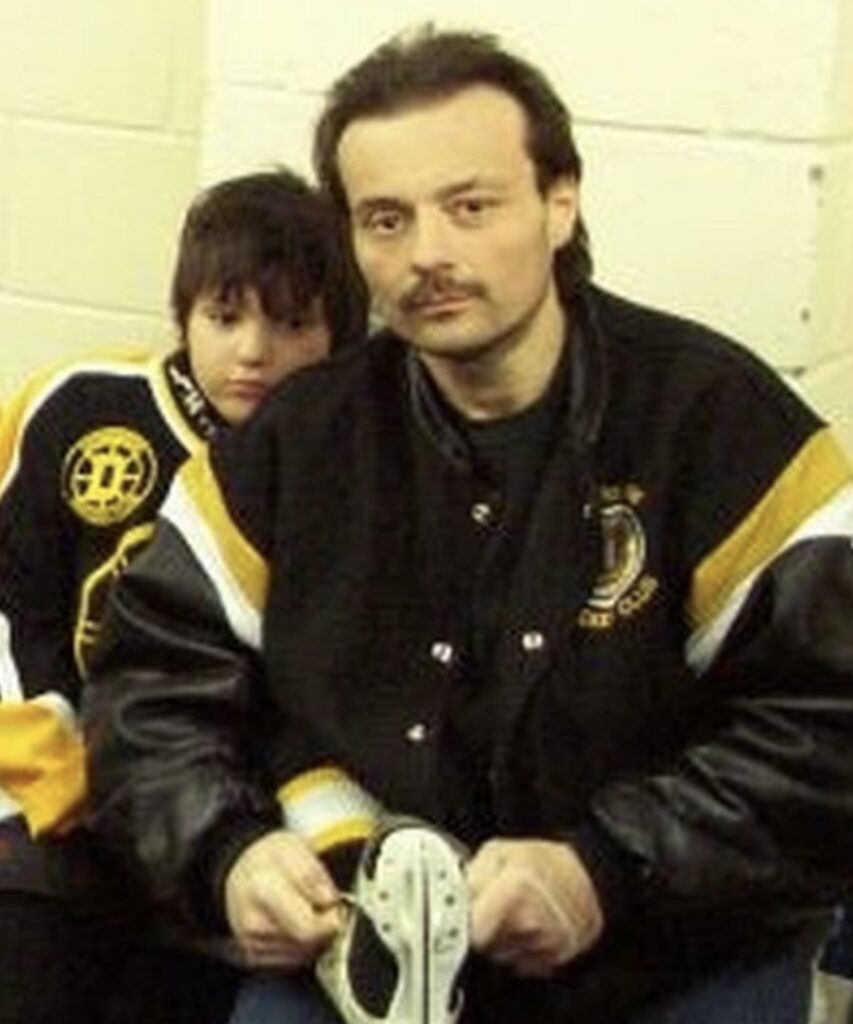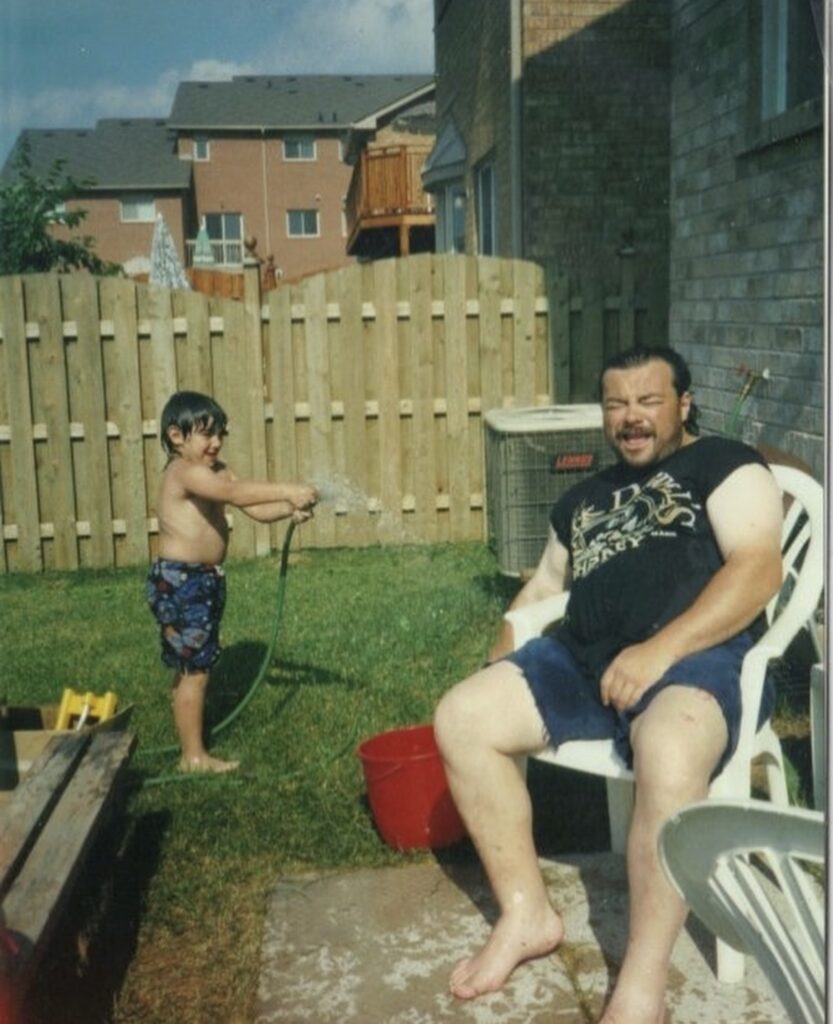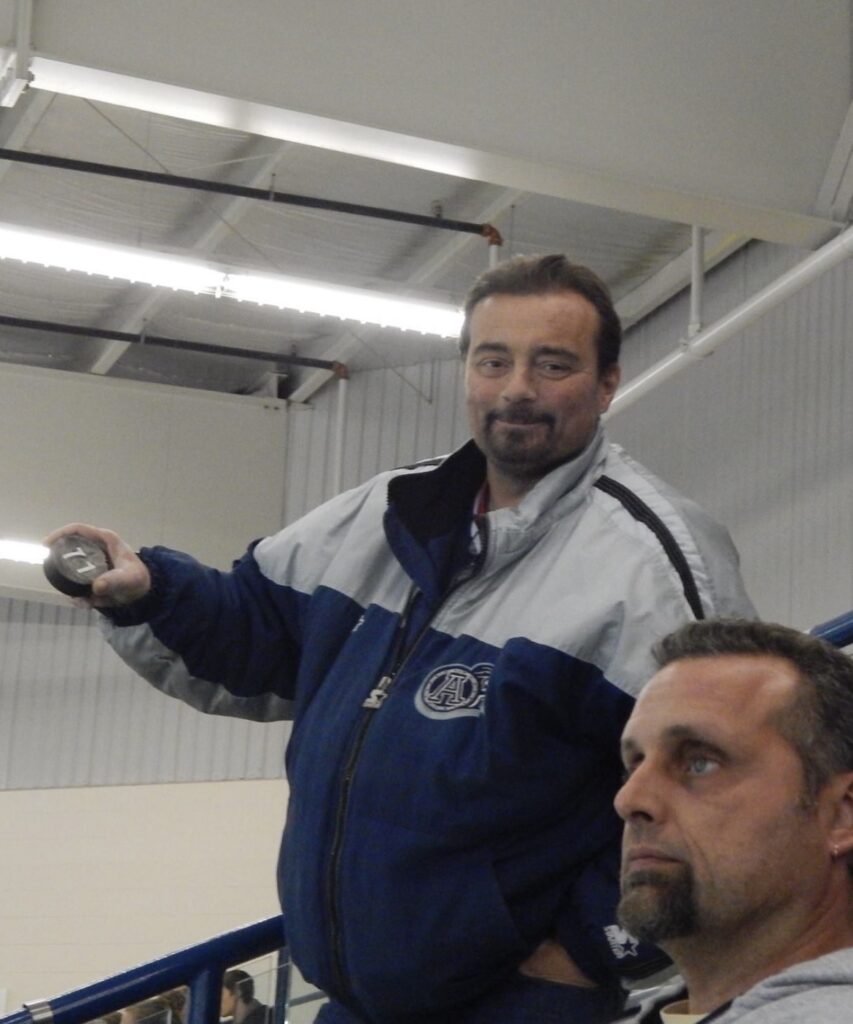By Emerson Williams
During the 20th game of his season with the Ottawa 67’s, a crosscheck from behind left Cosimo Fontana out of playing professional hockey for six months. The possibility of having to trudge through another year of school was dreadful to Fontana once he graduated high school in 2011. He was getting closer and closer to the dream. Going straight to the Ontario Hockey League (OHL) saved him from the shackles that school put around his free spirit. But a sixth concussion made him anything but free, trading those shackles for a prison in his own bedroom.
“It was a really dark time. I just kept thinking like ‘What am I doing? Is any of this worth it to make it to the NHL?’ … All my friends back home would talk about these parties. I was sitting in a dark room and I couldn’t even look at my phone.”
Like his eyes and his smile, Fontana got his love for hockey from his dad. The OHL was the first step for so many of the greats whose faces were detailed on hockey cards boxed up in the garage and late night airings on their living room TV. Fontana’s sixth concussion left him ready to pack his bag and walk back down the mountain. He was pushed closer to greatness than so many others and now, he was two steps back from the NHL. When those six months passed, he dropped down to the Greater Ontario Junior Hockey League’s (GOJHL) ‘A’ division, then to the ‘B’ division. But despite the fallback, he was near the summit. He would keep pushing, even if it wasn’t his own passion pushing him, but the guilt of not doing anything with the investment put into him did instead. Hockey was it for him. He knew nothing else.
Chilhood photos of Cosimo Fontana’s father, Gino Fontana. Images via Cosimo Fontana.
In the rink, the parent is the seed of the passion. Like Fontana, Woolwich, Ont., head coach Jake Radcliffe started playing hockey when he was three years-old. Now, Radcliffe coaches his four year-old son’s team. He names hockey as the thing that gave him a committed, fun-loving attitude. His hope is that hockey will teach his kid to be the same.
But coaching has been a rude awakening to the realities of minor hockey for Radcliffe, having such a positive experience in his early years playing the sport. Parents regularly battle with him over rules and regulations that control the level of aggression and competition for younger players.
“I’ve had parents come up to me and ask why we’re not playing against other teams. It sounds rude, but I almost can’t help but chuckle in their face and say ‘No, just no.’” Radcliffe says.
According to Radcliffe, the pressure from parents really begins the closer kids get to their draft year. His coaching career began with kids aged twelve to seventeen. He claims there is a young man permanently etched in his brain because of his family’s treatment, even turning to search for any recent information about the player online upon recollection.
“He was a decent hockey player. Always good enough to make our team. Deep down, I knew he was a good kid, but he was very distant and very uninterested in the sport. There was a lot of pressure coming from Mum and Dad. He was always in power skating, skill work and [private] camps.” Radcliffe says.
“I still remember the last year I had that [AA] team. His parents brought him out to every single AAA tryout in the area. They brought him to Kitchener, Waterloo, Guelph and then the Dad went as far as to bring him out for Huron-Perth. They were the worst team in the area. He actually made that team and I remember it was shocking because first of all, I knew this kid didn’t like to play. But now he was going to be playing and practicing five to six times a week.”
Since Radcliffe began coaching, anxiety over saving kids from tyrant parents has loomed over him. He finds himself feeling frustrated frequently by social media posts from parents gawking at their kid’s talent. He calls it exploitative, making an idol out of those who can’t even tie the skates you see them cut across the screen with.
“You can give these kids a positive environment to grow up in, but at the end of the day, you can’t change the world.”
Hockey parent Nadia Elmasry-Weiss is learning to walk the line of supportive parenting with kids in the sport. Her 17 year-old son plays AAA in Guelph, Ont., while her 13 year-old daughter plays for a co-ed team in Waterloo, Ont. From seeing other parents destroy their kids with ruthless expectations, she aims to be different.
“I’d like to be the hardest on them before anyone else can. These parents grew up with hockey. It can become pretty cloudy; whether you’re there for your kid or for yourself. My husband has struggled with that. There’s this idea that your kids are reflective of yourself. If my kid does well, or if my kid does bad, it has nothing to do with me,” she says.
She admits that there’s a part of her that wishes she could just pull her kids out of hockey. She worries about how the push to the top will backfire. Encouraging their high expectations has become too difficult a web for her to weave.
“Since they were both little, they’ve both indicated to me they want to play in the NHL … People have asked [my daughter] about playing hockey in [the PWHL]. Her favourite team is the Boston Bruins. Her favourite player is [David] Pastrnak. She has no interest in playing with females. She’s only a kid.”
Fontana calls his hometown of Toronto the ‘mecca’ of Ontario minor hockey. He was used to kids out of the city trying to take his spot on high-level teams, with families wrestling to be close to the professional limelight of the Maple Leafs and the Marlies. In comparison to Radcliffe’s players, Fontana’s childhood in hockey was rare. His time with private instructors and private ice wasn’t forced onto him. It was a gift from a supportive dad who took notice of his athleticism.
“I always had my dad in my corner … He would take me out of school and get me on shinny ice when no one was there. If I relied on my natural abilities, I think I would’ve slowly phased out [of the sport],” says Fontana.
But even his dad’s good intentions eventually morphed into pressure on Fontana’s shoulders. All the emphasis on his success followed him everywhere, even to Europe.
When a call came from Varese, Italy to play for semi-professional the Varese Killer Bees (HC Varese) a year into Fontana’s time with the Caledonia Corvairs, he packed a suitcase and shipped himself off overseas. He had never been on a plane, but he wanted to make his family proud. In part, by representing his Italian heritage. Mostly, to bring some pay off for all the time and effort put into him. It was this mindset that motivated him to play in Sweden soon after. Even though he was scared to be on his own for the first time, he felt his sport had his back for the first time in a while. Quickly, he bounced back to the player he was before his concussion sacked him.
“I didn’t speak [either] language. Arguing with [referees] or listening to the coaches was always tough. But that first year in Italy, I was back. I was like ‘I’m me again.’ I was in shape. I was at the top of my game. I ended up getting the most goals in league history.”
But having all his eggs in the hockey basket soon set in for Fontana. He was 22 years-old with no degree, unlike all the boys he played with in the minors. He was on the other side of the world, forced into relying on that natural ability without that support he had as a young player.
Fontana’s international advisor gave him a call in December of 2016, asking if he would be open to taking an athlete’s scholarship from Brock University. The school had taken notice of his impressive record from his most recent season in Sweden. Suddenly, he was in St. Catharine’s, Ont., meeting his future fiancée in a bar and winning two back to back championships with his teammates.
Fontana and his teammates celebrating a game win in 2018. Video via Cosimo Fontana.
Still, there were pitfalls to getting back on track. Fontana fractured several vertebrae, threw out his shoulder and had two concussions by his third year. Fontana credits his then girlfriend Kaylie Estrela for being his first wake-up call. She was the first to see him as more than just the player on the ice, but the man he was too. She was watching from the stands when he was concussed for the second time that year.
“It gave me a fucking heart attack. It was the scariest moment of my life. I stood up because I knew it was him. The guy [that hit him] got kicked out, but he was down for at least two minutes. I became a caretaker for the three weeks he was out,” says Estrela.
The injury tally was becoming unbearable in Fontana’s daily life, going from class to class. Worse, he didn’t want to be in class anyways.
“School was always just a hurdle. It felt like something that was just in my way. I was never good at school. I sucked at tests and homework … By that next concussion, I was like ‘this is getting ridiculous. I’m tired of having to go through all these hoops to convince my professors that I can’t do papers because I can’t stare at anything for longer than five minutes.’”
Fontana graduated from Brock in 2020 with a Bachelor’s in Sports Management. Even with calls from Italy and Sweden once again, he still retired the number 14 jersey. He was the first of his family to go to university.
“I felt a sense of relief [when I graduated]. I never thought I was going to be able to go to university. I knew guys going out [to the east coast] and Europe. I knew I could’ve played at that level. But with COVID, the training stopped. Everything stopped. When everything opened back up, I asked myself ‘Do I really have that drive to build myself back up again?’ I really wanted to just get into that next chapter of starting a career.”
Fontana now works as a head coach in the Greater Toronto Hockey League (GTHL). He spends some time giving private lessons for Barn Burner Academy too. Being on the other side now, he notices the environment’s flaws. Fontana regrets his lack of anticipation for things falling through. He wants his young pupils to feel more free in the sport and most importantly, excel with a more realistic mindset than he did.
“As someone who grew up going through [the minor hockey system], I understand the chances of [playing professionally] are very slim. Harping on all the right steps to go pro is a waste of time. It’s about instilling values and showing them that work ethic is really important,” he says.
“If I were to change anything about my upbringing through hockey, I would put more emphasis on school. My dad was always so set on me making the NHL. Everything else fell behind. I tell my kids now that hockey is important, but you have to have other things going for you.”



